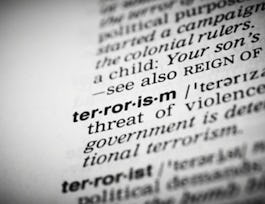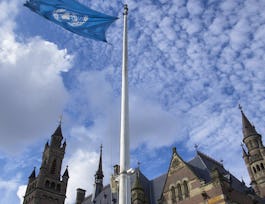“International Humanitarian Law in Theory and Practice” is the first MOOC of the Kalshoven-Gieskes Forum on International Humanitarian Law, which is the platform within the Grotius Centre for International Legal Studies of Leiden University for the research, teaching and dissemination of international humanitarian law (IHL).


International Humanitarian Law in Theory and Practice
Taught in English
Some content may not be translated
63,465 already enrolled
(1,694 reviews)
Recommended experience
Skills you'll gain
Details to know

Add to your LinkedIn profile
12 quizzes
See how employees at top companies are mastering in-demand skills


Earn a career certificate
Add this credential to your LinkedIn profile, resume, or CV
Share it on social media and in your performance review

There are 6 modules in this course
It is great that you are joining us! In this course you will get a deep insight into the law that governs armed conflict. Before you start with “International Humanitarian Law in Theory and Practice”, we invite you to first take a look around the course content. As you will notice, this MOOC starts with an introduction module in order to help you study successfully in an online environment, and to familiarize you with international humanitarian law. If you encounter any difficulties while studying, please let us know in the forum. For technical difficulties or questions regarding the course certificate, you can always contact the Coursera Learner Helpdesk. We truly hope that you will enjoy this course. Good luck!
What's included
2 videos6 readings2 discussion prompts1 plugin
In the first week, we will introduce you to the basic concepts of IHL, its history and place in the international legal order. We will discuss two different areas of IHL, “Hague law” and “Geneva law” respectively, and its main legal instruments. At the end, we will look at armed conflict and the protection of war victims from a human rights law perspective, in an engaging discussion with Prof. Helen Duffy.
What's included
2 videos2 readings1 quiz1 discussion prompt2 plugins
In this second week, we will study the scope of application of IHL. IHL regulates armed conflict, and therefore we will start by exploring the two different types of armed conflicts: international and non-international armed conflicts (IACs and NIACs). We will also look at the different rules that apply to each type of conflict. In this module, we will furthermore discover special situations of conflict, like belligerent occupation, foreign intervention and NIAC-spill over, which can impact the character of a conflict. At the end of this week we will touch upon situations below the armed conflict threshold, and Prof. Robin Geiss will tell us all about the so-called “global war on terror”.
What's included
5 videos4 readings2 quizzes1 discussion prompt1 plugin
In this week, we will look through the eyes of combatants and other fighters, and learn how military operations should be conducted. We will familiarize ourselves with the most important principles that need to be applied on the battlefield including those of distinction, proportionality, precautions and the prohibition of unnecessary suffering. We will discover that civilians who refrain from hostilities should never be targeted. At the end of this module we will see that IHL also sets limits to the weapons that can be used by combatants, and Prof. Michael Schmitt will share his viewpoint on whether armed drones and other modern technologies like cyber warfare are lawful under IHL.
What's included
6 videos3 readings3 quizzes2 discussion prompts1 plugin
In this module we will look through the eyes of sick and wounded soldiers, detainees, enemy civilians and vulnerable persons in conflict, including children and women. We will discover how IHL safeguards persons who are not - or not anymore - fighting. Together, we will find out that each person should be treated humanely; that detainees should receive water and food; and that young children should never be recruited by the military. At the end of this module, Vincent Bernard from the ICRC will discuss with us the biggest challenges to protect persons who refrain from fighting, and will give us an insight into various IHL success stories across the globe.
What's included
6 videos6 readings4 quizzes1 discussion prompt1 plugin
In this final module, we will look into the implementation and enforcement of IHL, which is crucial to increase respect for IHL. After discussing different enforcement methods, we will highlight two methods: Demands for compensation and criminal prosecutions. Here, we will learn how war victims can claim compensation and how States and International Courts and Tribunals can initiate criminal prosecutions for war crimes when serious violations of IHL have been committed. At the end of this module, Jeroen van den Boogaard from the Netherlands Defense Academy will explain what the Red Cross and Red Crescent Movement, as well as the military can do in order to make wars more humane. He will also inform us what everyone can do to increase respect for IHL.
What's included
4 videos4 readings2 quizzes2 discussion prompts1 plugin
Instructors



Recommended if you're interested in Law

Universiteit Leiden

Universiteit Leiden
Why people choose Coursera for their career




Learner reviews
Showing 3 of 1694
1,694 reviews
- 5 stars
83.18%
- 4 stars
15.63%
- 3 stars
0.82%
- 2 stars
0.17%
- 1 star
0.17%

Open new doors with Coursera Plus
Unlimited access to 7,000+ world-class courses, hands-on projects, and job-ready certificate programs - all included in your subscription
Advance your career with an online degree
Earn a degree from world-class universities - 100% online
Join over 3,400 global companies that choose Coursera for Business
Upskill your employees to excel in the digital economy
Frequently asked questions
Access to lectures and assignments depends on your type of enrollment. If you take a course in audit mode, you will be able to see most course materials for free. To access graded assignments and to earn a Certificate, you will need to purchase the Certificate experience, during or after your audit. If you don't see the audit option:
The course may not offer an audit option. You can try a Free Trial instead, or apply for Financial Aid.
The course may offer 'Full Course, No Certificate' instead. This option lets you see all course materials, submit required assessments, and get a final grade. This also means that you will not be able to purchase a Certificate experience.
When you purchase a Certificate you get access to all course materials, including graded assignments. Upon completing the course, your electronic Certificate will be added to your Accomplishments page - from there, you can print your Certificate or add it to your LinkedIn profile. If you only want to read and view the course content, you can audit the course for free.
You will be eligible for a full refund until two weeks after your payment date, or (for courses that have just launched) until two weeks after the first session of the course begins, whichever is later. You cannot receive a refund once you’ve earned a Course Certificate, even if you complete the course within the two-week refund period. See our full refund policy.






